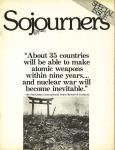"Teacher, bid my brother divide the inheritance with me." These words in the 12th chapter of Luke begin one of the most relevant discourses of Jesus for today. (Luke 12:13-34) The complaint came out of the crowd, much of which was poor. It came from a "have-not," from the brother who had come out on the short end of his father's wealth.
Like so many of us, this brother coming to Jesus said, "I need something else to make me what I'm supposed to be; I need something outside myself to make me complete." I identify this have-not brother with black people in our society. We as black people many times haven't been able to distinguish between light joy and real happiness, between the true and the counterfeit. We may even have the Cadillacs and the clothes, having used our resources on ourselves.
Jesus uses the example of the haves to communicate his spiritual message to the have-nots. In responding with the example of the rich man with many barns, Jesus lets us know that many times his message to the poor and the rich is the same. He stands against a whole value system that traps the hearts, minds, and souls of people in all classes.
Jesus uses the have-not brother's own covetousness against him, taking an example of the most positive symbol in this world's value system and showing how even that is bankrupt. He hits the brother where he longs with all of his heart, soul, mind, and strength to be. Jesus knew that there was no virtue in being poor. He knew that in many cases the only thing that made the poor different from the rich was that the poor trusted riches they did not possess.
This was a very tough thing for Jesus' disciples to take, because in that day, as in ours, material "blessings" were associated with spiritual goodness. Later in his ministry when Jesus explained, "How hard it is for those who have riches to enter the kingdom of God," his disciples replied with disbelief, "Then who can be saved?" "What is impossible with men, " Jesus answered, "is possible with God." (Luke 18:24-27).
It is possible because of the great economic/spiritual reversal of all time, that one who gives up material and social resources for the sake of the kingdom will receive a truly abundant life on earth, and an eternal life thereafter (Luke 18:28-30).
Christians have bounced between two extremes: one believing that to be rich is the obvious sign of spiritual salvation, the other believing that wealth witnesses to spiritual depravity. We have not offered many models for the way rich people can be serious disciples and stewards. We can't fault the rich for their motivation or their drive, or their discipline. What we can question is their direction. Faced with the problem of a surplus of grain, all of the rich farmer's drive, ambition, and energy boiled up in the question of verse 17: "What shall I do? I have no room to store my crops."
That question is asked with the same distress with which the Philippian jailer asked the question, "What shall I do to be saved?" (Acts 16:30). Likewise, the rich young ruler desperately asked, "What shall I do to inherit eternal life?" (Luke 18:18) and the multitudes asked John the Baptist, "What then shall we do?" (Luke 3:10).
The problem was that the rich farmer was seeking to apply his resources to the wrong issues in life, to things and possessions.
The Philippian jailer, the rich young ruler, and the multitude surrounding John the Baptist got consistent answers from Paul, Jesus, and John. Paul told the jailer to believe, and we know from Paul's writings that this meant a total surrender of one's life to Jesus Christ. Jesus got specific in some of the terms of the surrender by telling the rich young ruler to follow him, but first to mobilize all of his resources and give them to the poor. John the Baptist pointed the multitudes to the Christ, but first gave them explicit economic instructions. These admonitions make demands upon rich and poor alike: even one who has just two coats or some food is commanded to share.
What does this mean? To me it means that the way we use our resources is related to our salvation. Jesus made this connection with Zaccheus. After being told of Zaccheus' reparations for past injustices, even to giving half of his goods to the poor, Jesus said, "Today salvation has come to this house."
I am finding that deep down I feel guilty when God puts resources into my hands. Why? Maybe because it puts more pressure on me to live my faith, to put my treasures into heaven, rather than storing them up here on earth.
The pressure is on me most as I discover that God's plan for getting our treasure into heaven is really very practical and possible: to invest it in the only things going to heaven--people. The Bible teaches that if we can get our resources into people--especially the poor--and as those people take our treasures to heaven, our hearts will be secure; we will be happy and blessed and satisfied. We will be rich.
I believe that if we can just learn how to get our wealth to the poor, we will have treasures in heaven and a lot less worries on earth. We can then provide models that will free poor people from their guilt, their loneliness and their oppression.
When this article appeared, John Perkins was a contributing editor to Sojourners and president of Voice of Calvary in Mendenhall and Jackson, Mississippi.

Got something to say about what you're reading? We value your feedback!
